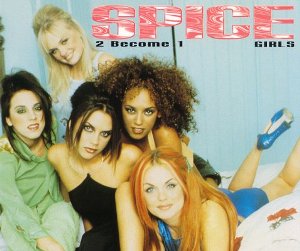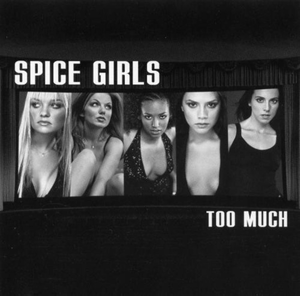
The Spice Girls are an English pop girl group formed in 1994. The group comprises Melanie Brown, also known as Mel B, Melanie Chisholm, Mel C, Emma Bunton, Geri Halliwell, and Victoria Beckham née Adams. In 1996, Top of the Pops magazine gave each member of the group aliases, which were adopted by the group and media. With their "girl power" mantra, the Spice Girls were pop culture icons of the 1990s. Time called them "arguably the most recognizable face" of Cool Britannia, the mid-1990s celebration of youth culture in the UK. They are cited as part of the Second British Invasion of the US.

Emma Lee Bunton is an English singer, songwriter, media personality, and actress. She rose to prominence in the 1990s as a member of the girl group Spice Girls, in which she was nicknamed Baby Spice. With over 85 million records sold worldwide, the group became the best-selling female group of all time.

"Say You'll Be There" is a song by English girl group the Spice Girls from their debut studio album, Spice (1996). It was co-written by the Spice Girls with Jonathan Buck and Eliot Kennedy, after they left their former management in 1995. Production duo Absolute incorporated a mix of dance-pop and R&B influences into the song, which includes a harmonica solo, played by Judd Lander. The song's lyrics describe the things the group went through together and how they were always there for each other. It received mixed reviews from music critics, many of whom praised it for its catchiness, while others were critical of its production.

"Viva Forever" is a song by English girl group the Spice Girls from their second studio album, Spiceworld (1997). The song was co-written by the group with Matt Rowe and Richard Stannard, while production was handled by the latter two. It is a pop ballad with Spanish-style elements. The song's theme is about a summer romance during a holiday vacation, while the lyrics discuss past experiences or memories. It was released as the album's fourth and last single on 20 July 1998.

"Who Do You Think You Are" is a song performed by British pop group Spice Girls. It was written by the group members with Paul Wilson and Andy Watkins—also known as Absolute—for the group's debut album Spice, released in November 1996. The song is heavily influenced by early 1990s dance-pop, and has a nu-disco-style beat that resembles the music of the late 1970s. Its lyrics are about the superstar life, and how someone can get trapped in the world of fame.

"Wannabe" is the debut single by British girl group the Spice Girls. Written and composed by the group members in collaboration with Matt Rowe and Richard "Biff" Stannard during the group's first professional songwriting session, it was produced by Rowe and Stannard for the group's debut album, Spice, released in November 1996. The song was written, composed, and recorded very quickly; but the result was considered lacklustre by their label, and was sent to be mixed by Dave Way. The group was not pleased with the result, and the recording was mixed again, this time by Mark "Spike" Stent.

Spice is the debut studio album by English girl group the Spice Girls. It was released on 19 September 1996 by Virgin Records. The album was recorded between 1995 and 1996 at Olympic Studios in Barnes, London, and Strongroom Studios in Shoreditch, London, by producers Matt Rowe and Richard Stannard, and the production duo Absolute. Spice is a pop album that incorporates styles such as dance, R&B and hip hop. It is considered to be the record that brought teen pop back, opening the doors for a wave of teen pop artists. Conceptually, the album centered on the idea of Girl Power, and the hype surrounding the group was compared to Beatlemania.

Forever is the third and final studio album by English girl group the Spice Girls. It was released on 1 November 2000 by Virgin Records. It is their only album without Geri Halliwell, who later rejoined the group for their Greatest Hits album in 2007. Despite failing to match the commercial success of the group's two previous albums, Forever peaked at number two on the UK Albums Chart and was certified Platinum by the British Phonographic Industry (BPI). Worldwide, the album has sold over four million copies. Two singles were released from the album including the double A-side "Holler" and "Let Love Lead the Way", which peaked at number one on the UK Singles Chart. The first single from the album, "Goodbye", was actually released almost two years earlier.
Michelle Stephenson is a British singer and television presenter. At the age of 17, she was briefly a member of the English girl group that would go on to become the Spice Girls.

"2 Become 1" is a song by the English girl group the Spice Girls. Written by the group members, together with Matt Rowe and Richard Stannard during the group's first professional songwriting session, it was produced by Rowe and Stannard for the group's debut album Spice (1996).

"Too Much" is a song by English girl group the Spice Girls from their second studio album, Spiceworld (1997). The group members co-wrote the song with its producers, Paul Wilson and Andy Watkins—the songwriting and production duo known as Absolute—while the group was shooting scenes for their film Spice World.

"Stop" is a song by English girl group the Spice Girls from their second studio album, Spiceworld (1997). The group co-wrote the song with its producers, Paul Wilson and Andy Watkins of the Absolute production duo, during the filming of the film Spice World.

"Spice Up Your Life" is a song by English girl group the Spice Girls from their second studio album, Spiceworld (1997). The song was co-written by the group with Matt Rowe and Richard Stannard, at the same time as the group was shooting scenes for their 1997 film Spice World, while production was handled by the latter two. It is a dance-pop song, with influences of Latin rhythms such as salsa and samba. The song's theme reflects the group desire to "write a song for the world" while the lyrics has been labeled as dance oriented with a self-promoting message.

"Mama" is a song by the British girl group the Spice Girls. It was written by the Spice Girls, Matt Rowe and Richard Stannard, and produced by Rowe and Stannard for the group's debut album Spice, released in November 1996. "Mama" is a pop ballad that features instrumentation from keyboards, a rhythm guitar, a cello, and a violin, and its lyrics deal with the difficulties in relationships between mothers and daughters that appear during their childhood.

"What Took You So Long?" is a song by English singer Emma Bunton from her debut solo studio album, A Girl Like Me (2001). The song was written by Bunton, Richard Stannard, Julian Gallagher, Martin Harrington, John Themis and Dave Morgan, whilst produced by Stannard and Gallagher in Biffco Studios in Dublin, Ireland. It was released as the album's lead single in the United Kingdom on 2 April 2001. A pop rock song, its sound is influenced by the work of AOR artists such as Sheryl Crow, Gabrielle, and the band Texas. For the lyrics, Bunton explained that the song is about men taking longer than women to realise they are in love, a concept inspired by her past romantic relationships. The song received mixed to positive reviews from music critics, with many of them praising the melody and Bunton's vocal delivery, while others were critical of its production.

"Step to Me" is a song by the British pop group the Spice Girls. It was written by the group members with Eliot Kennedy and produced by Absolute. This song was included on the Japanese edition of the Spice Girls' second album, Spiceworld.
Chris Herbert, is a talent manager who has helped oversee the careers of the Spice Girls, Five, Stephen Gately and Hear'Say, B*Witched, The Honeyz, Ben's Brother. He is the son of the late talent manager Bob Herbert.
Viva Forever! was a jukebox musical written by Jennifer Saunders, produced by Judy Craymer and was directed by Paul Garrington.
The Spice Girls are an English pop girl group that first came to international prominence with the release of their chart-topping debut single "Wannabe" in 1996. In 1997, the band became involved in an unprecedented marketing phenomenon, leading to a prolific number of Spice Girls merchandise and sponsorship deals. With the official Spice Girls branding on hundreds of different products, they became the most merchandised group in music history. The Spice Girls brand reportedly produced over £300 million worldwide through merchandise in 1997. Globally, the group's total grosses were estimated to have been $500–800 million by May 1998.
English pop girl group the Spice Girls have starred in one feature film, as well as several television specials, documentaries and commercials. They made their film debut in 1997, starring in their feature film Spice World. The film was a commercial success, but was widely panned by critics, earning the group the Golden Raspberry Award for Worst Actress.














